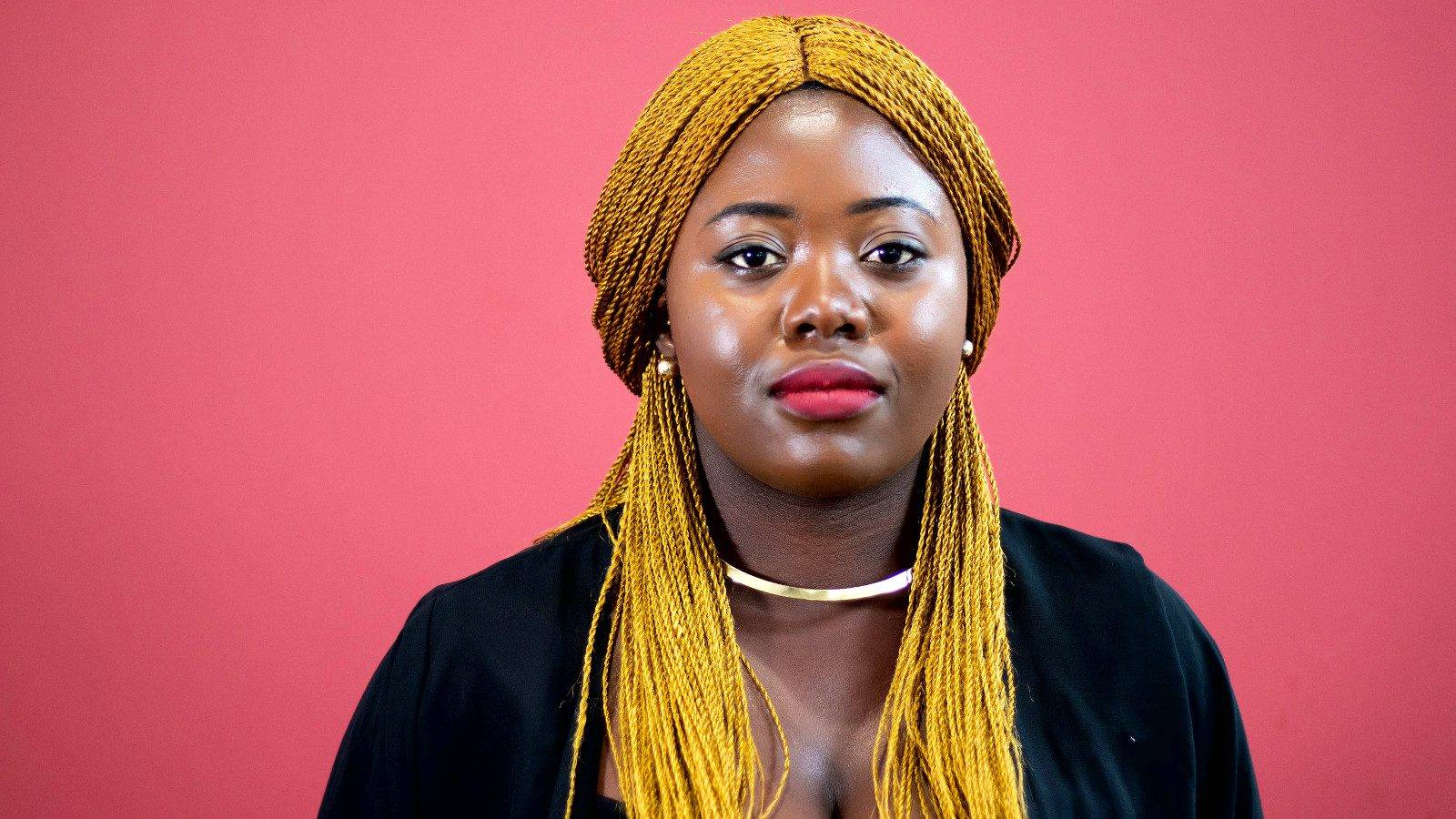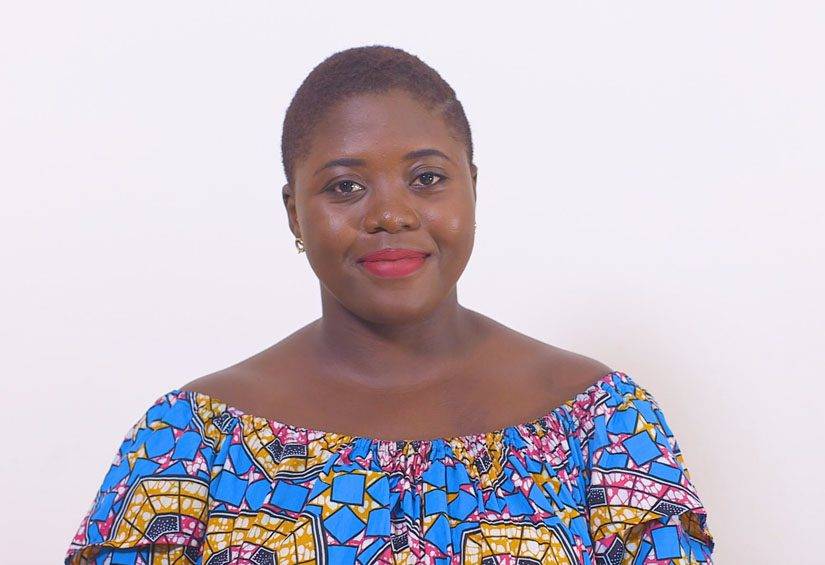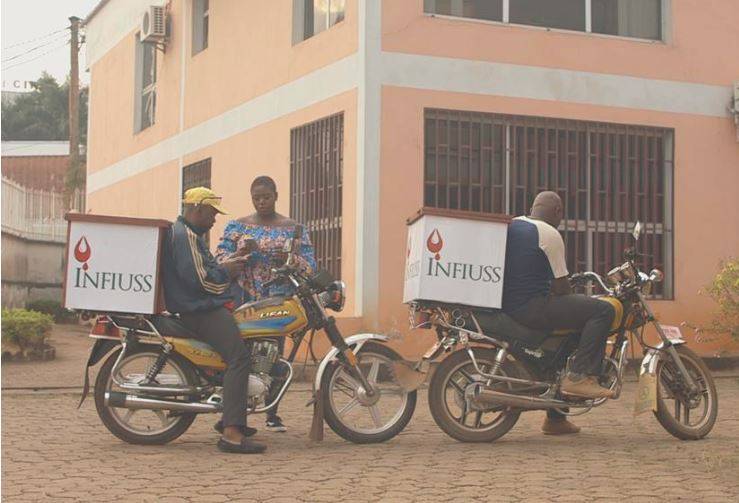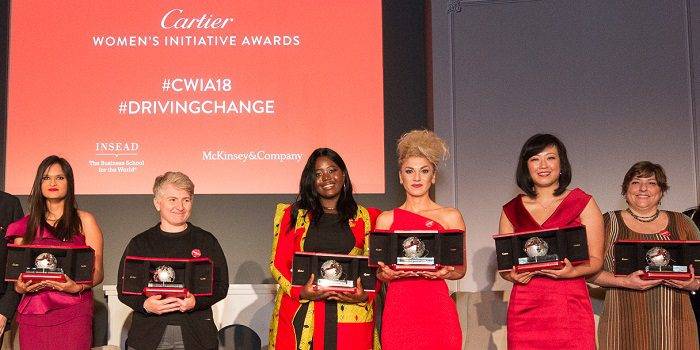There’s An Uber Boda For Blood Deliveries In Cameroon And This 22-Year-Old Is The Driving Force

While Melissa Bime may not exactly have fond memories of her nursing school days, there’s a particular incident that she remembers like it was yesterday.
At the time, she was undergoing a compulsory internship as a student of Nursing in a health centre in Cameroon and on this particular day, she watched with concern as a distressed mother made frantic efforts to save her five-year-old who was in a critical state..
The poor, little girl urgently needed a blood transfusion to have any shot at survival but finding her blood match was a struggle. Three fruitless days later, the little girl passed on, causing great grief to her mother and people familiar with the matter. And yet more grief came when it was discovered that there was a hospital only 20 minutes away which had just what was being sought all along.
Even though working in the hospital had made Bime quite accustomed to seeing people pass on, this incident was particularly painful as the poor girl could have been saved if someone thought to look in that hospital, or if someone knew where to look, or if there was Infiuss.

Infiuss is the name of the online blood bank Bime set up in December 2017. The little girl’s demise might be a tragic statistic, but it could be said that there is now some respite for patients in similar circumstances.
In under two years of operation, Infiuss has delivered close to 3,000 bags of blood to patients admitted in various health centres across Cameroon’s two major cities – Douala and Yaounde. The blood is sourced from three blood banks and is conveyed to areas of need on special-purpose motorbikes.
Melissa Bime has sure covered a lot of ground since getting Infiuss up and running but she remains thirsty for more. These days, the goal is to increase the number of deliveries two or three-fold and also reach out to other cities in Cameroon. There are also talks of taking advantage of Infiuss’ network of donors to set up the company’s very own blood bank in the near future.
Cameroon is not only struggling with a deficit in blood supply – the country’s Ministry of Public Health has it that only some 90,000 pints of blood are donated annually against the required 400,000 – there is also lack of data on existing blood stocks. And Infiuss appears to be solving some of those problems at the moment.
Melissa Bime has certainly come a long way from those nursing school days but you’d be mistaken to think she’d had her path figured out from the off. Even though her present venture still links her to the medical field somewhat, she was heading for a very different path post-nursing school.
Bime grew up in Bamenda (part of Cameroon’s politically-marginalised Anglophone minority) with her mother and older sister. Her mother was a lawyer who handled a lot of cases pro bono – maybe that’s where Bime gets her thing for social entrepreneurship from. It was a small family that didn’t exactly have much but could afford most of its needs.
Her mother had been able to get herself and her sister a good education and both girls seemed headed for a career along the medical line. Bime’s older sister had, in fact, qualified as a nurse and was practicing in the United States.
Melissa Bime had similar intentions when she opted for the same field but that was not to be. She got discouraged during her stay in nursing school, and that was because she felt the system was “broken” and no one was willing to do a thing about it. When Bime graduated from nursing school aged 20, she’d already resolved to not practice.
Instead, she moved to Yaounde, learned French on her own, and got herself immersed in blogs that are concerned about raising funds for social enterprises.
“I saw people with incredible solutions to Cameroon’s problems but no idea how to get funding,” she says.
That was when she started a business called Social Ventures. The business was about bringing individuals with an entrepreneurial mindset together, exploring opportunities, and packaging business proposals.

Through Social Ventures, she came in contact with many aspiring entrepreneurs – one of whom was one Fien Rosette; a young nursing mother who found the price of baby food too steep and was eager to shake things up.
The young woman had found cheap, nutritious baby-food in corn-based porridge mixed with groundnuts, moringa, and some other ingredients.
All that was now needed was a way to get it out there. With Bime’s assistance, the same woman now runs Kayvey Nutri Foods; an international baby-food brand that currently sells in Cameroon, Mali, and Chad.
Social Ventures aligned Bime with many entrepreneurs drawn out from various sectors. Soon, she found herself thinking like one.
All the undertakings of Social Ventures had had something to do with meeting a pressing need and when she began to think along similar lines, she found herself going to back her days in nursing school – to the poor, little girl who had passed on.
An idea hit her and it was a pretty simple solution – at least, in theory. The online blood delivery platform would certainly help the solution, but the execution was always going to be the tough nut to crack.
In Cameroon, irrespective of the circumstance, blood banks are wont to release blood until two or three replacement donors have been found. The first hurdle that she had to surmount was to assemble a network of reliable donors – so far, they are over 800 and counting.
Next, she got a few hospitals on board. Once that was done, it was time to take care of technology and logistics – databases, motorbikes, drivers. Then, she also spread the word to doctors throughout the city.

As per financing, Bime was able to get her hands on some money from a running family business which involved handing out motorbikes to commercial cyclists and having them remit a specific amount daily. In her case, she could lay hands on USD 20.00 daily from the two motorbikes her family had helped procure.
Within six months, she’d accumulated about USD 5 K and that money helped her set up Infiuss initially. The two motorbikes were refurbished and kitted, they were now to serve only blood delivery purposes.
Before Infiuss, getting a transfusion typically required about a week of waiting, but these days one hour is more like the number. With a USD 20.00 service charge on the going pint rate of USD 40.00, many consider it a life-saving alternative that is well worth it.
It hasn’t exactly been an entirely cozy ride, though. In between Cameroon’s doctor-patient ratios dangling precariously low, promising private efforts getting tepid assistance from the government, and misinformation/superstitious misconceptions about donating blood on the part of the public, Bime has a lot to contend with in her line of work.
Notwithstanding, she’s forging ahead. Infiuss currently has some 13 employees on its roster and it wants to partner with more blood banks within and outside Yaounde and Douala. And even beyond the shores of Cameroon.
More so, to quell misinformation, she organizes awareness campaigns in both schools and churches and also uses the Infiuss bilingual app to get the word out.
While doing all that, she’s also pursuing lofty goals – one of which is setting up the country’s first privately-owned blood bank.
In Cameroon, there are regulations stipulating that a blood bank must be affiliated to some existing medical centre, and in an effort to get around that bottleneck, Bime has been able to set up a clinic that offers lab work, general consultation, and follow-up services.

This project was helped in no small part by the USD 100 K cash prize she won in April 2018 at the Cartier Women’s Initiative Awards.
Even though some of the clinic’s proceeds are expected to pay for parts of the blood bank project, it looks like Bime still has her work cut out for her in coming up with at least USD 200 K – the estimated cost of setting up a basic blood bank. And because of that, the Cameroonian entrepreneur is on the lookout for competitions, VCs, and angel investors.
Going forward, Melissa Bime hopes to solve Cameroon’s blood distribution problem, as well as come up with other simple solutions to big social problems. Her long-term goal is to mend her country’s “broken” healthcare system.
Featured Image Courtesy: VentureBurn